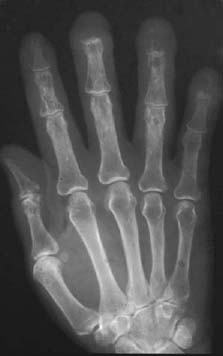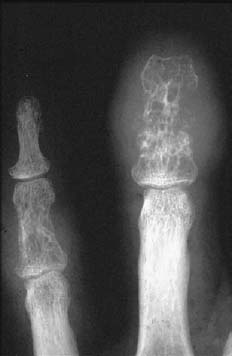CASE 127 Peter L. Munk and Anthony G. Ryan A 47-year-old woman presented with swelling and discomfort in the fingers. Figure 127A Figure 127B Radiographs of the hand were obtained (Fig. 127A) with coned views of the distal phalanges of the contralateral hand (Fig. 127B). Mild soft-tissue swelling is present over the distal aspect of the fingers bilaterally. The underlying bone of the fingertips shows irregular destruction, with almost complete destruction of the tufts and distal phalanges of the third through fifth digits of the hand (Fig. 127A). Irregular radiolucency affects the distal metaphyses of the proximal and middle phalanges of several fingers. The coned view shows a lacelike pattern of destruction in the distal phalanx (Fig. 127B). Osseous sarcoidosis. The osseous findings are typically very characteristic, and in the face of other manifestations, such as lymphadenopathy (especially pulmonary hilar), a confident diagnosis can be made. Occasionally, other conditions should be considered, such as Sarcoidosis is a disease that, in most cases, involves soft tissues, especially lymph nodes, skin, lungs, and other organs. Only about 10% of patients have bone involvement, with the hands and feet being the most common sites. Recognition of musculoskeletal involvement has increased considerably with the advent of MRI, which permits soft-tissue and marrow lesions to be more readily seen. Unknown. Patients typically present between age 20 and 40. People of African descent are more commonly afflicted than Caucasians. Patients may have very mild symptoms but may also present with lymphadenopathy, fever, anemia, weight loss, hepatosplenomegaly, skin or ocular lesions, or pulmonary fibrosis/infiltrates. Most patients have a favorable clinical outcome and may have resolution of their condition without treatment, although steroids are frequently used. Lung parenchymal or multiorgan involvement indicates a poorer prognosis.
Sarcoid
Clinical Presentation


Radiologic Findings
Diagnosis
Differential Diagnosis
Discussion
Background
Etiology
Clinical Findings
Stay updated, free articles. Join our Telegram channel

Full access? Get Clinical Tree


